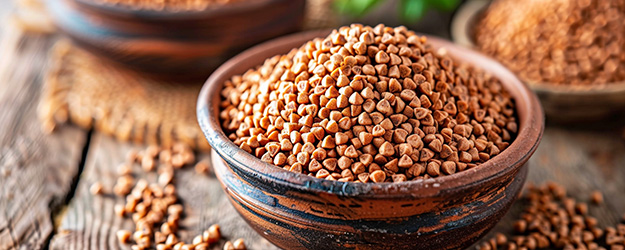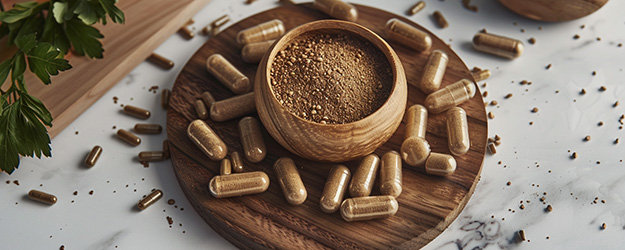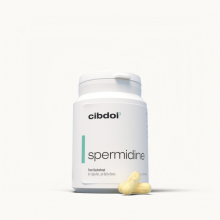What Foods Are High in Spermidine?
Last updated:
Published:

What Foods Are High in Spermidine? A Comprehensive Guide
In the quest for a healthier lifestyle, many of us are on the lookout for foods that offer the most benefits. One compound that's been gaining attention is spermidine. But what exactly is spermidine, and more importantly, what foods are high in this nutrient? Let's dive into a simple, informative exploration of spermidine-rich foods that are not only beneficial but also easy to incorporate into your daily diet.
Contents:
- Understanding Spermidine
- Top Spermidine-Rich Foods
- FAQs: Your Questions Answered
- Conclusion
-
Frequently Asked Questions (FAQs) about Spermidine-Rich Foods
- What is Spermidine?
- Why Include Spermidine in Your Diet?
- How Can I Easily Add Spermidine to My Meals?
- Can Children Eat Spermidine-Rich Foods?
- Are There Any Side Effects of Eating Spermidine-Rich Foods?
- Can Spermidine Help with Weight Management?
- How Often Should I Eat Spermidine-Rich Foods?
- Are Spermidine Supplements As Effective As Food Sources?
- Do Cooking Methods Affect Spermidine Content?
- Can Spermidine-Rich Foods Improve Skin Health?
- How Do I Know If I'm Getting Enough Spermidine?
- Summary
Understanding Spermidine
Spermidine is a naturally occurring compound that plays a crucial role in cellular function and health. Its benefits range from promoting cellular renewal to potentially supporting longevity. Now, you might wonder, how can I include spermidine in my diet? The answer lies in several everyday foods.
Top Spermidine-Rich Foods
Whole Grains: A Nutrient Powerhouse
Whole grains are not only good for digestion but also a great source of spermidine. Foods like wheat germ, barley, and whole grain bread contain notable amounts of this beneficial compound. Including these in your meals can be a simple yet effective way to boost your spermidine intake.
Aging Cheese: Flavorful and Rich
Who doesn't love cheese? Beyond its delicious taste, aged cheeses like blue cheese, cheddar, and Parmesan are excellent sources of spermidine. Enjoying a slice of cheese can be more than just a treat—it can be a health boost!
Mushrooms: A Versatile Ingredient
Mushrooms aren't just for adding flavor to your dishes; they're also packed with spermidine. Whether you prefer button, shiitake, or portobello, incorporating mushrooms into your diet can provide you with this essential compound.
Legumes: Nutrient-Dense Superfoods
Legumes, including peas, lentils, and soybeans, are not only high in protein but also spermidine. These versatile foods can be easily added to soups, salads, or main dishes, making them an ideal choice for a health-conscious diet.
Nuts and Seeds: Snack on Health
Nuts and seeds are known for their healthy fats and protein, but they're also a good source of spermidine. Almonds, walnuts, and sunflower seeds can be a quick snack or a crunchy addition to your meals, offering a spermidine boost.
 Incorporating Spermidine into Your Diet
Incorporating Spermidine into Your Diet
Now that we know what foods are high in spermidine, how can we incorporate them into our daily routines? It's simpler than you might think. Starting with whole grains at breakfast, enjoying a piece of aged cheese for a snack, or adding mushrooms and legumes to your lunch and dinner can significantly increase your spermidine intake.
FAQs: Your Questions Answered
-
Is spermidine supplementation necessary? While foods are the best natural source of spermidine, supplements can be considered if your diet lacks these foods. However, it's always best to consult with a healthcare professional before starting any new supplement.
-
Can spermidine help with aging? Research suggests that spermidine may have potential benefits in supporting cellular health and longevity. Eating spermidine-rich foods can be a step towards a healthier, longer life.
-
Are there any easy recipes to boost spermidine intake? Yes! Simple dishes like whole grain pasta with mushrooms, lentil soup, or a mixed nuts and seeds snack can effortlessly increase your spermidine consumption.
-
How much spermidine should I aim for daily? There's no established daily recommended intake for spermidine, but including spermidine-rich foods in each meal can help ensure you're getting a beneficial amount.
Conclusion
Understanding what foods are high in spermidine and incorporating them into your diet can be a simple yet effective way to support your health. Remember, the key is diversity—combining various spermidine-rich foods will not only enrich your diet but also support your overall well-being. Let's embrace these nutritious foods and enjoy the journey to a healthier life.
Frequently Asked Questions (FAQs) about Spermidine-Rich Foods
What is Spermidine?
Spermidine is a natural compound found in our bodies and in various foods. It supports cell renewal and overall health. This makes spermidine-rich foods valuable for maintaining well-being.
Why Include Spermidine in Your Diet?
Including spermidine in your diet helps support cellular health and may improve overall longevity. It's a simple way to care for your body from the inside out.
How Can I Easily Add Spermidine to My Meals?
Adding spermidine to your meals is easy. Try using whole grains like quinoa in your recipes, snack on nuts like almonds, or add mushrooms to your dishes. These small changes can make a big difference.
Can Children Eat Spermidine-Rich Foods?
Yes, children can enjoy spermidine-rich foods. Foods like whole grains, nuts, and cheeses are not only safe but also nutritious for children. Always ensure food is age-appropriate and prepared safely.
Are There Any Side Effects of Eating Spermidine-Rich Foods?
Eating spermidine-rich foods is generally safe for most people. However, if you have allergies or specific dietary restrictions, it's important to choose foods that fit within your health guidelines.
Can Spermidine Help with Weight Management?
While spermidine itself is not a weight loss supplement, including spermidine-rich foods in a balanced diet can support overall health and well-being, which is beneficial for weight management.
How Often Should I Eat Spermidine-Rich Foods?
Incorporating spermidine-rich foods into your daily meals is a good practice. There's no strict rule on how often, but a varied diet will naturally include these beneficial foods regularly.
Are Spermidine Supplements As Effective As Food Sources?
While supplements can provide spermidine, getting nutrients from food ensures you benefit from other vitamins and minerals too. It's always best to get nutrients from natural food sources when possible.
Do Cooking Methods Affect Spermidine Content?
Some cooking methods may reduce spermidine content slightly, but generally, spermidine-rich foods retain their beneficial properties. Eating a variety of foods both raw and cooked is advisable.
Can Spermidine-Rich Foods Improve Skin Health?
Spermidine supports cell renewal, which can positively impact skin health. Including spermidine-rich foods in your diet can contribute to maintaining healthy, vibrant skin.
How Do I Know If I'm Getting Enough Spermidine?
Ensuring a varied diet with plenty of whole grains, legumes, nuts, and other spermidine-rich foods will likely provide you with sufficient spermidine. Listen to your body and adjust your diet as needed.
Incorporating spermidine-rich foods into your diet is a straightforward and natural way to support your health. With a variety of foods to choose from, it's easy to enjoy the benefits of spermidine every day.
Summary
In the quest for optimal health, incorporating spermidine-rich foods into your diet emerges as a simple yet effective strategy. Spermidine, a natural compound found in various foods, plays a vital role in promoting cellular health and longevity. This guide highlights the importance of spermidine and outlines key sources, including whole grains, aged cheeses, mushrooms, legumes, and nuts and seeds. Whole grains like wheat germ and barley, for instance, are excellent for digestion and are packed with spermidine. Aged cheeses, such as blue cheese and Parmesan, not only add flavor to your meals but also provide a healthy dose of spermidine. Mushrooms, another versatile ingredient, along with nutrient-dense legumes like lentils and soybeans, are great for boosting your spermidine intake. Nuts and seeds offer a snackable way to consume spermidine, with almonds and sunflower seeds being particularly noteworthy.
Incorporating these spermidine-rich foods into daily meals can significantly contribute to your overall well-being. This guide also addresses common questions, ensuring that the information is accessible, easy to understand, and straightforward to translate into other languages. It emphasizes the natural inclusion of spermidine through diet over supplementation, advocating for a balanced and varied dietary approach. By highlighting easy-to-add options and the health benefits of spermidine, this guide aims to encourage readers to make informed choices about their nutrition, supporting a healthier, longer life through simple dietary adjustments.









